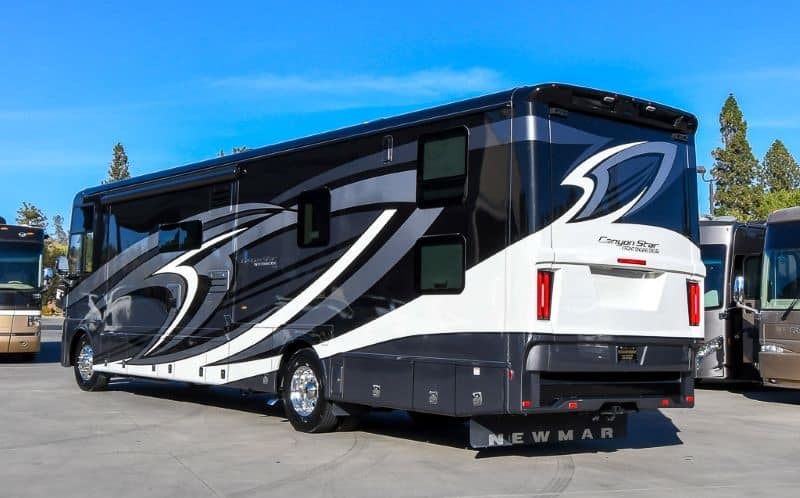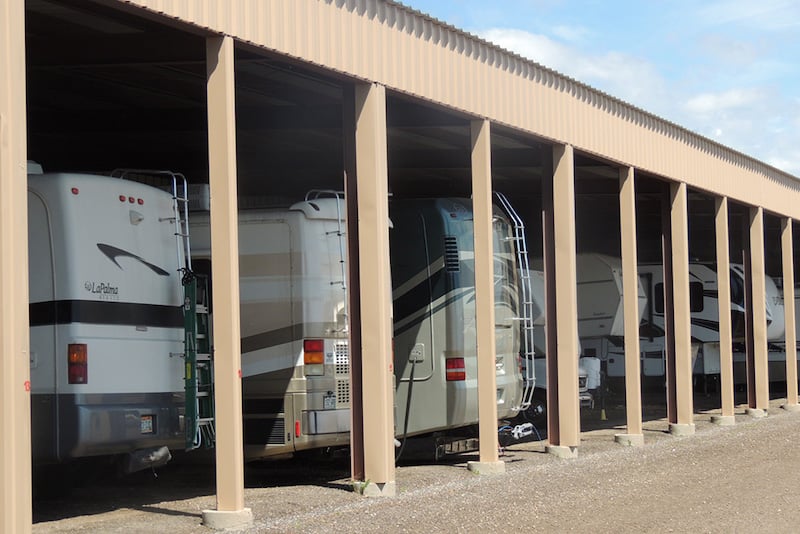Nobody wants their motorhome to break down, but unfortunately, it can happen to anyone. While an older model might be more likely to break down, even with a fresh off-the-lot rig, breakdowns are still possible.
But, you might be wondering, just how often do motorhomes break down exactly? By this we mean, not things like a broken water heater or a trailer axle bearing. Rather, mechanical issues in a drivable RV rendering it undrivable.
It’s a complex topic (more so than you might think) that warrants a thorough discussion. Let’s go in-depth on how often motorhomes break down, what causes breakdowns, and what to do about them.
How Often Do Motorhomes Break Down?
When it comes to the question “How often do motorhomes break down,” the answer is a resounding “It depends.”
Okay, that might not be the most satisfying answer. But in reality, it’s hard to say exactly how often an RV will break down. This is because there are a variety of factors that affect it. The biggest factors are the age and mileage of the RV, and how well it’s maintained.
Put simply, the older an RV is, and the more miles on it, the more likely it is to break down. This is for the simple fact that all of the different parts that make the RV work have worn down over time. The more wear and tear they have, the more likely they are to break down while in use.
Maintenance, of course, also plays a huge factor. If your motorhome only has 10,000 miles on it, but you’ve never so much as changed the oil, then you’re much more likely to break down. On the other hand, an old RV that’s been meticulously maintained will be much less prone to breaking down.
Of course, even a fresh off-the-lot motorhome can still break down. Inevitably, nearly every RV will experience a breakdown at some point in its lifetime, just as is the case with almost any vehicle. No matter what you do to prevent it, sometimes things just happen.
The good news is that by staying on top of maintenance and being prepared, you can help mitigate the chances and impact of RV breakdowns. Remember: a well-maintained RV is a reliable RV.
Why Do Motorhomes Break Down?

So now that we’ve covered the question of “how often do motorhomes break down,” let’s go a step further and talk about why RVs break down.
Your RV is a complex symphony of different systems and moving parts, even more so than your typical vehicle. The biggest culprit by far of RV breakdowns is not properly maintaining all the different parts of your RV. That said, sometimes things go wrong even with perfect maintenance.
Another easy way to cause an RV breakdown is by pushing your RV too hard. This can be by exceeding towing capacity, driving too fast in rough conditions, and hard braking and accelerating. You can prevent this simply by following the manufacturer’s recommendations for proper use, and by being a safe driver.
Some of the most common reasons why motorhomes break down are:
- Fuel system issues, especially with a faulty fuel pump
- Charging system issues, such as a faulty alternator or an issue with the battery itself
- Cooling system issues, such as with the coolant hoses, thermostat, or fan clutch
- Steering system issues, such as worn-out linkages in the steering gear
- Brake issues, such as low brake fluid or worn-down brake pads
- Worn-out wheel bearings
- Suspension failures
- Transmission failures
What To Do If Your Motorhome Breaks Down
It’s never fun when your motorhome breaks down, but if it happens to you, it’s important not to panic.
The first order of business in any RV breakdown is to, if possible, get your RV to a safe area. If the RV still drives, pull into a breakdown lane or otherwise try to get yourself out of the flow of traffic.
Next, carefully assess the situation. Check your dashboard for any indicator lights that might clue you into the source of the issue. A tire sensor telling you about a problem tire could save the day.
Then, step out of the RV and place down safety cones or caution triangles. You want to be able to safely inspect the vehicle. Set the first one about 10 feet behind your rig, the second about 100 feet behind the middle of your bumper, and a third about 200 feet behind, in line with the left side of the RV.
Unless you smell gas or propane, ensure passengers stay safely in the vehicle with seat belts buckled. Do an inspection of your RV’s exterior, as well as under the hood, to see if you can identify the problem. If you have the know-how, consider making a quick fix to get you to the nearest garage.
If that’s not an option, it’s time to call roadside assistance (or your insurance company if they provide this coverage). Make sure to make a note of your location, such as the nearest exit and/or mile marker, so that they can find you.
Can I Fix My Motorhome If It Breaks Down?
So, can you fix your motorhome if it breaks down? The answer depends on the issue and your mechanical abilities.
If you have some basic mechanical knowledge and the right tools, you can get yourself out of many breakdown situations. Even if you can’t do a full-on permanent repair, you can likely at least patch the issue long enough to get to a mechanic’s shop.
But, be sure to only make a repair if it’s safe to do so, and if it will leave the vehicle safe to drive. It’s never worth risking your safety, the safety of your passengers, and the safety of others on the road in order to fix your RV.
Also be sure to weigh out whether it’s worth the time and effort to make a fix, instead of simply calling roadside service. If you’re in a remote area, it may well be worth the trouble, but if you’re only waiting a short time for the tow to arrive, it might not be.
Check out the Home Study Course from the NRVTA to learn how your RV’s systems work! It’s a great way to learn to maintain and repair your own rig.
How To Prevent Your Motorhome From Breaking Down
The number one biggest thing to prevent an RV from breaking down is staying on top of maintenance.
Keep a checklist of maintenance items in some form, and be sure to perform maintenance at the required intervals. That means doing things like:
- Top up and change out fluids
- Inflate, rotate, and replace tires
- Regularly replace filters
- Have your brakes checked regularly
An easy way to stay on top of RV maintenance is with an app like RV Life Maintenance. This will make it easy to track all the different maintenance items for your RV (and get alerts when it’s time to perform maintenance), and track all the maintenance and repairs you’ve done.
As an added bonus, these apps will also help you track things like fuel economy and expenses.
Besides maintenance, it’s also important to pay attention to your RV. You know your RV better than anyone, and if something seems off, you should check it out. If you hear any unusual sounds, smell any unusual smells, or feel anything unusual for driving, it’s a sign to call your mechanic.
Finally, being a cautious and safe driver will go a long way to preventing breakdowns as well. Not only will it keep you safe, but by avoiding bad driving habits like hard braking and accelerating, you also reduce wear on your RV and in turn reduce the chance of breakdowns.
Is Roadside Assistance Worth The Money?

You might wonder, especially if you’re a particularly handy type if roadside assistance is actually worth the money. In our opinion, the answer is a resounding “yes!”
With roadside assistance, you can save yourself valuable time and ensure peace of mind that, no matter what happens, help will be on the way. Working on an RV can always be difficult, but it’s especially challenging on the side of the highway.
Unless it’s a simple fix to get you to a mechanic, roadside assistance is well worth it to avoid dealing with such a headache.
There are many ways to get roadside assistance, such as through your insurance or by directly enrolling in a program like AAA. Another great way to get roadside assistance is through an extended warranty.
Extended warranties provide extra protection to the sizeable investment that is your RV. That way, if you have an RV breakdown, you’ll have the peace of mind of knowing that your RV is covered. And, with roadside assistance, you can rest assured help is on the way if you find yourself stuck on the side of the road.
Our personal recommendation for RV extended warranties is through Wholesale Warranties. They’re a top-reviewed provider of extended warranties with RV experts who understand RV lifestyles and can help you find the best coverage for you.
Final Thoughts About How Often Motorhomes Break Down
So, how often do motorhomes break down? The reality is, there are so many factors at play, it’s hard to give you an exact number. But the longer you have an RV, the more likely it is you’ll have at least one breakdown.
Thankfully, you can help mitigate the risk of RV breakdowns by staying on top of preventative maintenance. Keep a maintenance checklist, and follow it religiously to ensure your RV is up to date on all maintenance items.
If a breakdown does occur, you may be able to do a quick fix to get yourself to a mechanic’s shop. But the value of roadside assistance here cannot be overstated. Even if you yourself are a professional mechanic, the time saved from calling roadside assistance is well worth it.
Nobody wants their RV to break or even think about it breaking down. But it’s important to be informed about breakdowns, how to prevent them, and what to do when they happen. That way, you can ensure a safe and enjoyable trip, no matter what happens.
– Essential Motorhome Spare Parts & Tools To Carry
– When to Turn on Your RV Tank Heaters
– Why Does My RV Furnace Blow Cold Air?
– How Often Do Motorhomes Break Down?
About the Author:
Ryan Milejczak (mill-LAY-check) is a full-time freelancer writer and Florida native with a passion for RVs.
Currently, he’s saving up to do his own camper van conversion, which he plans to take across the US and Mexico.
When he’s not writing, Ryan loves cooking, hiking, practicing his Spanish, and taking care of his plants (currently at 23 plants and counting!)




